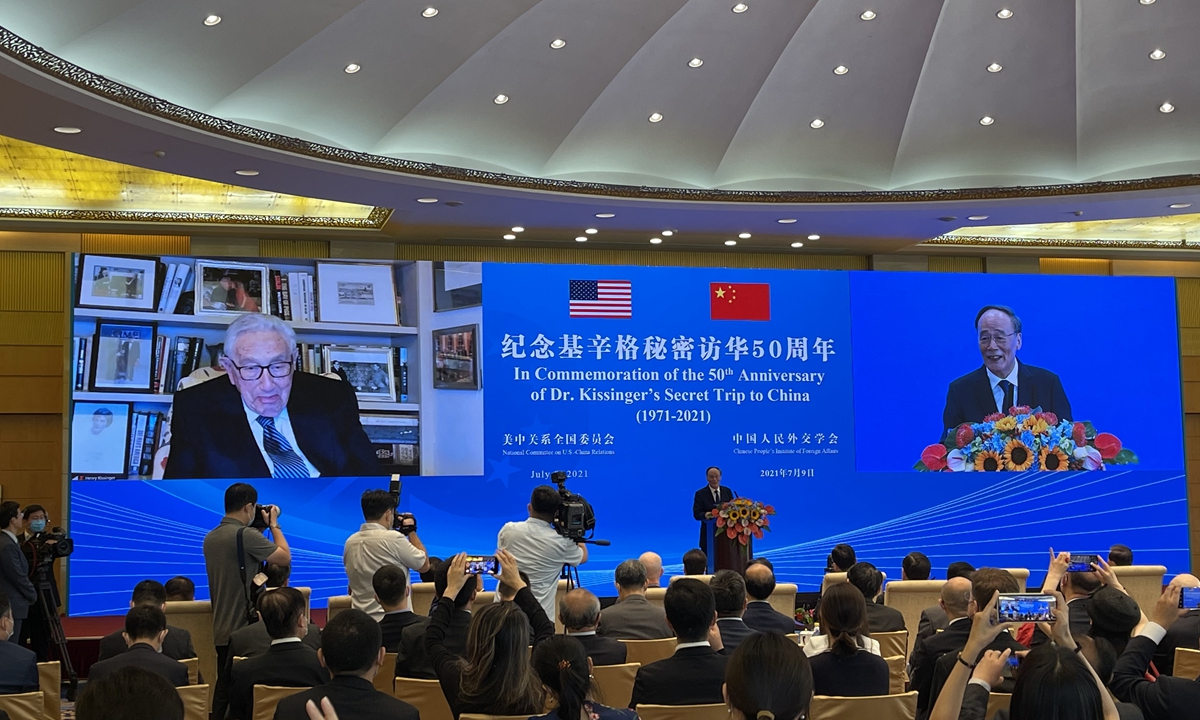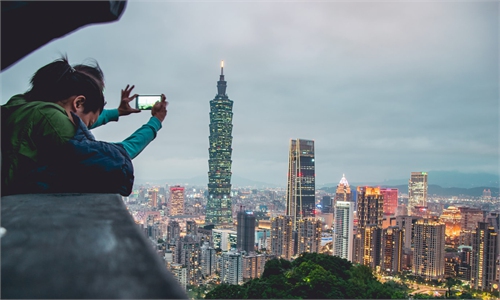
Chinese Vice President Wang Qishan speaks at a conference commemorating the 50th anniversary of Kissinger's secret trip to China. Photo: Courtesy of Chinese People's Institute of Foreign Affairs
Exactly 50 years after former US secretary of state Henry Kissinger made a secret trip to China, unveiling a new era for China-US relations, Chinese observers believe the ties are at a historic junction again between full confrontation and peaceful coexistence where the need for a similar ice-breaking dialogue between the two is more urgent than 50 years ago.
They noted that with the US view of China moving from strategic fear to paranoia, the US, under the Biden administration, is unlikely to form a China policy as clear and mature as the one carried out by Kissinger, urging the US to deeply reflect on its profound problems and correct its mistakes.
On Friday, Chinese Vice President Wang Qishan said at a conference to commemorate the 50th anniversary of Kissinger's secret trip to China that the US strategy toward China should avoid a vicious cycle of misleading and miscalculation.
Wang said the US should recognize that its biggest challenge is not China, but itself.
China-US relations are at a critical juncture. The two sides should properly handle differences and friction through dialogue and consultations, continue to expand common interests and strengthen people-to-people and cultural exchanges, Wang said.
On July 9, 1971, Kissinger made a secret trip to China. Fifty years later, amid growing difficulties of relations between the world's two largest economies, the 98-year-old former US official called for maintaining the essence of this trip - the commitment of both sides to end conflicts by putting aside divergences and seek dialogue.
Kissinger said via a video message that it's important for the two countries to understand that the premise which led to the visit in 1971 is still valid, and may be even more valid.
Based on the Nixon administration's understanding of various issues, the former US officials did not seek to reach any agreement but to create opportunities for subsequent negotiations when the Cold War shadowed the prospects of an international relationship. Kissinger told the audience that the most important words from the US government then were acknowledging that the Chinese people considered the island of Taiwan as part of China, there was only but one China as a precondition that would not be challenged, though the question might require a long period for a final resolution.
He called for dialogue similar to that between former US president Richard Nixon and Chairman Mao Zedong. "I therefore hope that they see this dialogue start soon on the major issues between us. Each nation should designate an individual with the confidence of their president to guide discussions. We'll keep in mind that not every problem can have an immediate solution," he said.
Chinese Foreign Ministry spokesperson Wang Wenbin said at Friday's media briefing that although the two have different social systems and cultural traditions, China and the US can achieve peaceful coexistence and mutual benefit as long as both sides adhere to the right direction of bilateral relations, insist on mutual respect and equality, seek common ground while putting aside differences.
China-US relations now stand at a new historical juncture. The choice between hostility, confrontation and mutual respect, between decoupling and cooperation, and between zero-sum game and mutual benefit and win-win cooperation is of great interest to people of both countries and the international community, Wang said. "We hope that the US will have a clear understanding of the global trend, follow the trend of the times, make the right choice and meet China half way," he said.
Revive the spirit
Pakistan helped to facilitate the secret visit of Kissinger 50 years ago. Pakistani Ambassador to China Moin ul Haque told the Global Times in a statement on Thursday that Pakistan has always been a bridge between different regions and civilizations.
The visit of Kissinger transformed the dynamics of international politics at that time and paved the way for the first visit of the US president to China and subsequent normalization of US-China ties, Haque said.
As we celebrate the 50th anniversary of this historic visit at a critical time in world history, I think we should revive the spirit of international cooperation and multilateralism and strive to find a solution to the challenges faced by humanity, Haque said.
China values the historic incident that had profound impact on the global pattern. But the 50 years anniversary of Kissinger's visit received little publicity and commemorations in the US.
Lü Xiang, a research fellow at the Chinese Academy of Social Sciences, told the Global Times that Joe Biden was reluctant to show special respect to Kissinger due to interests of the two parties, and some US politicians may worry that high-profile commemorations of the incident may weaken the US' position in China-US games.
Some US politicians and policy advisors are calling for a decoupling or disengagement with China, believing Kissinger's engagement with China was the wrong approach. But those who took part in the friendly experiences of first engagement said that China-US relationship development is a process of win-win cooperation, and Kissinger and former US officials had taken the right approach.
Nancy Tang, then interpreter for Kissinger, noted that the major lesson learned from the trip was the two sides understood they were different, and they did not have any fantasy of changing each other but to work on the common ground where they shared interests together, which was political wisdom.
Dialogue urgently needed
Ice-breaking dialogue and cooperation between China and the US is more urgent than 50 years ago, Yang Xiyu, a former Chinese diplomat and senior research fellow at the China Institute of International Studies, told the Global Times on Friday.
"China and the US realized a 'handshake that crossed the vast Pacific Ocean' 50 years ago when the two had not established diplomatic relations. Today, the two must be more capable of conducting similar substantive dialogue," Yang said.
"The need for substantive dialogue between leaders of the two countries is even more urgent than fighting the COVID-19 pandemic, as current bilateral ties, which are at the lowest in decades, has seriously affected the joint effort of dealing with the pandemic and the US should be fully responsible for this," Yang said.
He said that China-US relations are now at a historic crossroads, which the two either slide into confrontation, engage in a cold war and eventually a real war, or move toward peaceful coexistence.
The Taiwan question plays a key role in deciding whether the two will slide into a cold war, Chinese observers said.
To achieve a substantive dialogue, both China and the US have to innovate their diplomatic channels and build a new framework, Yang said, noting behind-the-scenes diplomacy like what Kissinger did 50 years ago can still work today.
The US is like an old man standing in a stadium, who wants to ace the game but is running out of breath, and the old man is very stubborn in changing his wrong mindset that the US would not get better if it did not suppress China, Lü said.
Since the Trump administration, the US' view of China has gone from strategic fear to paranoia, and this state has not changed under Biden, Yang said.
The Biden administration suppresses the Chinese tech sector, smears the Communist Party of China, discredits China's anti-epidemic achievement and hypes the "lab-leak" theory.
In the meantime, the US is not fully prepared on how to view China as its policies and words often contradict each other.
Kurt Campbell, the White House Coordinator for the Indo-Pacific, said this week that the US can co-exist peacefully with China and the US does not support Taiwan independence. Some media said Campbell's remarks on the Taiwan question made him the first Biden administration official to set out the White House's stance on the issue.
Lü said that the second half of 2021 is a key period for China-US relations, as the US may form rules on how to compete with China.

